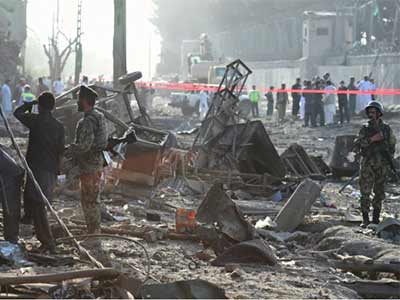
A suicide bomber blew himself up near the defence ministry building in Kabul on Saturday, causing “casualties”, officials said, hours after an attack in Afghanistan’s restive east killed 13 people.
The attacks come amid fresh efforts by Afghanistan, China, Pakistan and the US to restart talks aimed at ending the Taliban’s long and bloody insurgency in Afghanistan.
“It’s an attack, there are casualties,” Kabul police chief Abdul Rahman Rahimi told AFP, without giving details of how many were killed or wounded.
Defence ministry spokesman Dawlat Waziri said the suicide bomber was on foot when he struck.
An AFP photographer at the scene saw several ambulances converging at the scene of the explosion as police and the army set up a security cordon.
There was no immediate claim of responsibility for the attack but Taliban insurgents regularly hit government, military and police targets as part of their campaign to overthrow the Western-backed administration of President Ashraf Ghani.
Earlier on Saturday a suicide bomber on a motorbike struck at a market in Asadabad, the capital of restive Kunar province, killing 13 people and wounding at least 40.
A witness who did not want to be named, told AFP that an influential tribal elder who had led a local uprising against the Taliban in the past, was the target of the attack and was killed.
Last week delegates from Afghanistan, China, the US and Pakistan met in Kabul for a fourth round of talks aimed at forming a path back to the nascent peace process, which was interrupted by last summer’s announcement that Taliban leader Mullah Omar had died.
The fresh peace initiative comes as the insurgents wage an unprecedented winter campaign of violence across Afghanistan, underscoring a worsening security situation more than 14 years after they were driven out of power by US-led NATO forces.
On Wednesday the Taliban said they had not been officially contacted by Kabul about the resumption of talks, which began last year but came to a sudden halt after Kabul leaked news of the death of Taliban leader Mullah Omar two years earlier.



